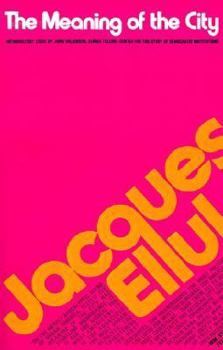Book Overview
Jacques Ellul, a former member of a Law Faculty at the University of Bordeaux, was recognized as a brilliant and penetrating commentator on the relationship between theology and sociology. In the... This description may be from another edition of this product.
Format:Paperback
Language:English
ISBN:0802815553
ISBN13:9780802815552
Release Date:January 1970
Publisher:William B. Eerdmans Publishing Company
Length:232 Pages
Weight:0.70 lbs.
Dimensions:0.6" x 5.5" x 8.5"
Customer Reviews
3 ratings
A masterpiece!
Published by Thriftbooks.com User , 17 years ago
Jacques Ellul is a master of prose and of theology. He beautifully weaves together themes from across the canon to produce a set of insights that kept me on the edge of my seat from beginning to end. Highly recommended!
The "Shout (that) Re-echoes Through Scripture From Beginning to End"-Jacques Ellul
Published by Thriftbooks.com User , 18 years ago
"COME OUT OF BABYLON (Rome), MY PEOPLE". Revelation 18, Daniel 2 This book is so beautiful. It's the first book I've read by Jacques Ellul. If all of his other books are similarly written, I'm totally sold on them. This book is the best book I've ever read by a christian author. It's very substantive, and you can tell throughout each and every page, that the author is steeped in biblical understanding and wisdom. Babylon doesn't exist anymore, though within 100 miles from Baghdad, Babylon is a symbol for all that is wrong with human civilization. So what does Babylon symbolize? What is it about this type of city that G-d despises, and how can the city please G-d? The leaving of the city is also symbolic; getting out of the mob is no easy matter, though physically still in the city, one's previously good mob friends will more than likely kill you when you get out (my thoughts). So the leaving I believe, though Ellul does not directly say it is spiritual, symbolic. My favorite chapter is the first, "The Builders", where Ellul speaks mostly about the first half dozen chapters of Genesis and how the first city was built by the first murderer, Cain, who killed his brother Abel. G-d told Cain that his brother's cries were heard by Him. Once Cain realizes his grave wrongdoing, G-d offers him protection by 'setting a mark' on him. Yet Cain seemingly takes no stock of this act of grace by G-d, and determined to secure eternity for himself, builds a city, and begets children. The city without G-d's presence and without citizens who acknowledge His sovereignty has a spiritual power of its own which draws people into everything the city has to offer, all of which is destructive and becomes a place, as Nahum, the Hebrew prophet cries, 'a bloody city, full of lies and distortions, no end of victims'. Yet G-d sanctified Jerusalem, an ordinary pagan city, by His presence, when King David captured the city for the jews. And this was the place where G-d redeemed mankind for all of our sins, potentially, if one truly gets out of these evil networks found among people who inhabit cities. The last chapters deal with the New Jerusalem described in books like Revelation and Ezekiel. This book, I believe, sounds the warning found in Ezekiel 33 from the watchman who sees the enemy coming and must alert the cities' inhabitants of G-d's coming judgment because it is clear from scripture that He will punish those (maybe not in this lifetime, but surely in the life to come) who twist the truth, who exalt themselves, who trample upon the livelihood of people, and those who foster all manner of deceivableness. This is a book that I got from the library, and is long overdue. One day I will buy this book to have on hand, its contents very valuable. Jacques Ellul is a French protestant lawyer and sociologist by profession, protestant christian by faith. His life, I'm discovering, unique. He was involved with the French underground during WWII and after th
Prophetic and Compelling
Published by Thriftbooks.com User , 24 years ago
In this remarkable piece of original theology, Ellul convincingly argues that the city exists as a theological category in Biblical thought. True to his own dialectical approach, he contends that the city is simultaneously an instrument of human rebellion and also a Divinely elected instrument of hope for humanity. This is a prophetic, compelling and ultimately hopeful foundation for a theology with which to engage the modern phenomena of urbanization.




